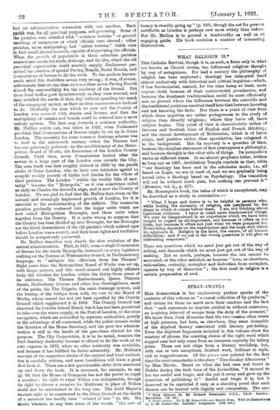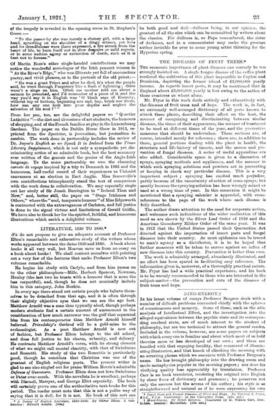STRAY-AWAYS4
Miss Sogiravima in her explanatory preface speaks of the contents of this volume as " a casual collection of by-products," and claims for them no merit save their candour and the fact that " each represents an impulse yielded to without resistance, an inspiring interval of escape from the duty of the moment." We know from Irish Memories that the two cousins often wrote at .high pressure, but here, as elsewhere, they seem incapable of the slipshod fluency associated with literary pot-boiling. Even the slightest fragments included in this volume show the mastery of phrase, the unerring choice of the right word which suggest ease but only come from an immense capacity for taking pains. These are not chips from a literary workshop, but, with one or two exceptions, finished work, brilliant in style, rich in suggestiveness. Of the pieces now printed for the first time the most remarkable is the story " Two Sunday Afternoons " by Miss Martin. Based on what she had seen and heard in Dublin during the dark time of the Invincibles, " it seemed to her too sordid and tragic, and she put it away and gave up the intention of publishing it." Sordid and tragic it is, but it deserved to be reprinted if only as a standing proof that such themes can be treated with dignity and compassion. The core • What Religion Is. By Bernard Boeanquet. D.O.L.. LL.D. London : Macmillan. Pe. Od.l t Stray-Aways. By E. OZ. Somerville and Martin ROSS. With 34 Bluatrationa. by E. GE. Somerville. Loudon : Longman. [lee. net.] e the tragedy is revealed in the opening scene in St. Stephen's Green :-
" To the passer-by she was merely a clumsy girl, with a large head, sprawling on the shoulder of a dingy artisan, yet love and -its dreadfulness were there expressed, a fire etruok from the heart of life, to burn itself out in slow despairs or mild regrets, or in some sudden agony or extinction of death, such aa it is best not to foresee."
Of Martin Ross's other single-handed contributions we may notice the wonderful monologue of the Irish peasant woman in " At the River's Edge," who was illiterate yet full of unconscious poetry, and vivid phrases, as in the portrait of the old priest:— " He was a great Priest and after he died, it's what the people said, he went through Purgatory like a flash o' lightning ; there wasn't .a singe on him. Often me mother told me about a sermon he preaehed, and I'd remember of a piece of it and the way you'd say it in English was 0 black seas of Eternity, without top or bottom, beginning nor end, bay, brink nor shore, how can any one look into your depths and neglect the salvation of his soul ' " From her pen, too, are the delightful papers on " Q 'artier Latinities "—the diet and diversions of art students, the humours of shopping, and of the French families at play in the Luxembourg Gardens. The paper on the Dublin Horse Show in 1913, re-
printed from the Spectator, is journalism, but journalism in exedeis. The work done in partnership includes the review of
Dr. Joyce's English as we Speak It in Ireland from the Times Literary Supplement, which is not only a sympathetic yet dis- criminating notice of an admirable book, but the best summary ever written of the genesis and the genius of the Anglo-Irish language. To the same partnership we owe the charming carnets de voyage inspired by a trip to Denmark in 1895 and the humorous, half-rueful record of their experiences as Unionist canvassers at an election in East Anglia. Miss Somerville's own contributions triumphantly stand the test of comparison with the work done in collaboration. Wo may especially single out her study of Sir Jonah Barrington in " Ireland Then and Now," and, better still, the paper on " Stage Irishmen and Others," where the " cool, temperate humour" of Miss Edgeworth Is contrasted with the extravagances of Carleton, and full justice Is done to the signal virtues and limitations of Gerald Griffin. We have also to thank her for the spirited, faithful, and humorous illustrations which enrich a delightful volume.











































 Previous page
Previous page